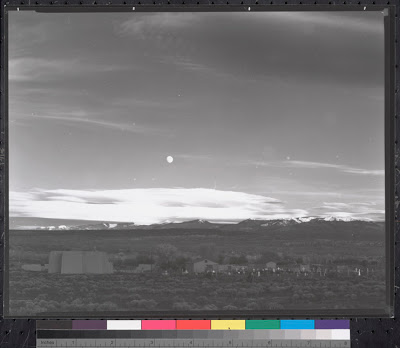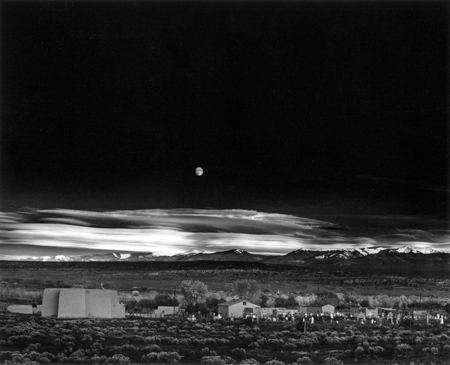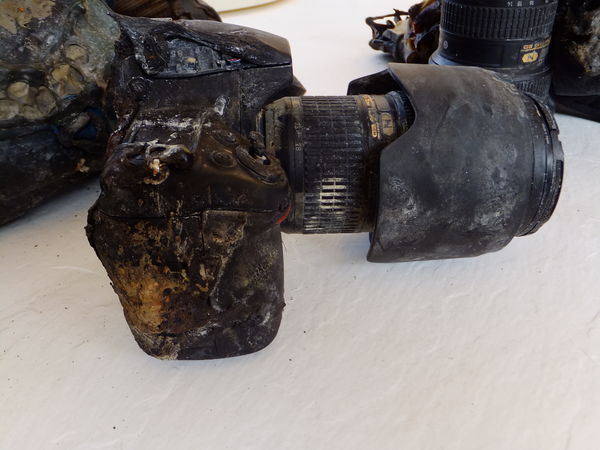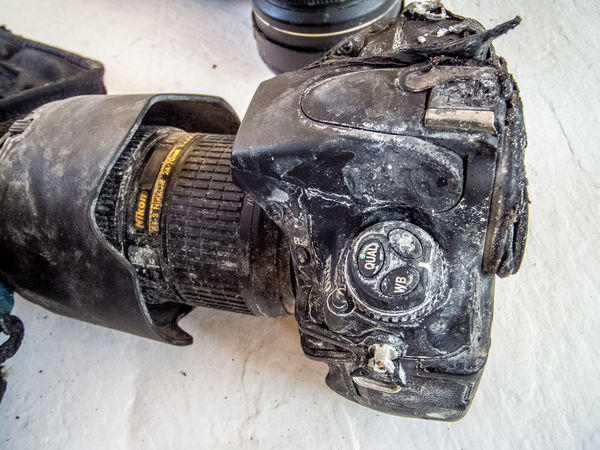Disappointed
Jan 9, 2017 11:49:18 #
Jan 9, 2017 11:55:31 #
dvier wrote:
Thank you I will check it out. Yes I think I need to get rid of the filter it is inexpensive and I was just using to protect my lens since I'm pretty clumsy
A very cheap filter might cause this. I regularly keep a Hoya or other high-quality, multicoated filter on all my lenses with excellent results. Tiffen, Hoya and some others make filters at several levels of quality. The cheap ones that are put in "kits" are like window glass. The best of them can even compensate for some flaws in lens coating. (Sorry, I don't understand how, but that is the claim.)
Of course you can simply not protect your lens, but at the price of lenses, I think GOOD filters are bargain insurance.
However, as someone has already pointed out. This is probably not difficult to "clone" out in post processing.
Jan 9, 2017 12:12:49 #
drklrd wrote:
Yeah and back in my day I walked to school in 6 inches of snow.... uphill both ways. Why is it everyone fixes it in post? Even my Video... (show quote)


Jan 9, 2017 12:28:18 #
Looks like you have some Photoshop work to do. Next time you are taking pictures around water try using a circular polarizer instead of a UV filter. The polarizer will remove a lot of reflection. Just don't overdo it or the water will look black.
Jan 9, 2017 12:44:53 #
Reinaldokool wrote:
A very cheap filter might cause this. I regularly ... (show quote)
I agree, and I have learned my UV filter lessons the hard way. A good UV filter is good insurance in keeping your expensive lenses protected but if it is an uncoated filter or a filter that just claims to be coated you will probably have excessive lens flare. Hoya Pro filters are good but they also make some cheaper uncoated filters. I would suggest this: Go to a large camera store which has a good selection and ask the salesperson to lay out all his different UV filters on the counter on a plain piece of paper. The lights in the store will reflect off the poor ones and not off the better ones. It will be pretty easy to pick out the one that you want. Good luck.
Jan 9, 2017 13:15:24 #
All the reasons that have been given could be the cause. Not knowing the angle of the sun, I really feel lens flair would be the least likely. Most probably, either a water drop on the glass or an out of focus object. Do get rid of the cheap filter and get a good one. Don't let those on here that believe filters degrade the image discourage you. Many competent testing labs have run the tests and it is false but some refuse to believe reality. I have run my own tests and you cannot tell the difference with good filters (all I use or have tested is good filters - Tiffen and B & W). A filter can add flaring to the photo if a bright light source is in the photo and then it MAY add to it. Removing the filter for the shot can reduce the flaring but you will still have some. Don't fall for the hype of a good filter degrading your shots; keep a good UV filter on there to help protect the front element and remove it when there is a bright light source in the photo for the shot because it can (and probably will) reduce the amount of flare in the shot.
Jan 9, 2017 13:22:15 #
drklrd wrote:
Why is it everyone fixes it in post? Even my Video... (show quote)
With wildlife you have to get the shot when the shot needs to be got. If there is a flaw or something that can be addressed to create a better image, well, that is what post processing is for. When you look at an image that was retouched with finesse and care, can you tell that it was? I am not a fan of SOOC, if this is what you are promoting - there is so much more than what is possible when you get to make the choices with regards to color, tone, contrast, and yes - flaws.
As far as shooting it right in the first place, take a look at the before and after in the images below - would you have considered the "before" version a good shot? I have seen these prints in person, and the before image is clearly a "perfect" exposure, even though it is an incredibly average, or below average, image when contact printed. The artistry and skill of the photographer is what created the iconic image many have admired through the years. And a copy has sold for as much as $609K
The funny thing is, Mr Adams wrote about getting it right in the camera, and theoretically, if you did, there was little need for post processing. Well, I have yet to see a SOOC image of his that didn't get the "treatment" that set his work apart from most of his contemporaries.
So to answer your original question - you "fix" it in post to fully exploit the captured image in a way that the camera, with it's comparatively crude set of adjustments cannot.
In video/cinema, clearly, the post processing choices are fewer, which is why you have multiple 18 wheelers lined up at a shoot (pass by a group of 8 of them this morning on Warren St, in the lower Manhattan financial district) and hundreds of technicians - and most of it is lighting-related - simply because you can't rely on natural conditions - you have to create the illusion. And then there is CGI. . . .
Contact Print

One of the more popular versions

Jan 9, 2017 14:18:08 #
UV filters for protection are rather useless. If something bashes the lens hard enough to damage the filter, and the lens, you gain nothing. If it breaks the filter, but not the lens, the filter shards will scratch the lens. It is better, and cheaper, and less risky, to become aware of what your lens is near, so it does not get bashed into things. Become less clumsy, and your worries will cease. I have never had a filter used for protection, and have never damaged a lens. I also have never had a 'gun accident'...because I am aware of where my guns point, and I never put my finger on the trigger until I am on target, and ready to fire. Filters for protection are for lazy thinking snapshooters who don't want to bother becoming aware. Filters also do often cause flare, ghosting, and other problems I'd rather not deal with. If I use a filter, it is for something other than lens protection, and then I take extra care to avoid the flares, etc. A little thought goes a long way.
Jan 9, 2017 16:22:21 #
dvier wrote:
could also be light come in through the view finder as well keep your eye close up in strong sun light at the back of you. But it does look 👀 like lens has reflected backThanks I thought it downloaded
Jan 9, 2017 17:14:19 #
dvier wrote:
Thanks I thought it downloaded
Use clone tool and get rid of filter.
Jan 9, 2017 17:52:02 #
Jan 9, 2017 18:22:49 #
I agree with Greg. It appears that you are using a long lens in which case there was "something" in the foreground and off to the
corner that you unwittingly caught in the frame during exposure? It is so OOF (out-of-focus) that it wasn't readily apparent to your
focus eye and also owing to the narrow depth of field. Happens a lot and something to be aware of when you shoot with longer
lenses. There is really nothing in the scene in that area that could flare (which you "could" fix in PhoShop of course...) unless it
was an errant drop of water on something in that area that flared a bit for you, esp. when you narrowed the scene down with your
selective lens. What think you? Filters "could" do this too but usually when shooting almost directly, or near directly into the sun, which
you were not. Just saying...
PS: DON'T FORGET...when you look through most camera lenses attached to a camera you are looking at the scene WIDE OPEN. Therefore
defects such as these out-of-focus critters will not be too apparent to your eye (or catch your attention as much?) until you get the
image processed and viewable, either on the LCD or best yet, your computer monitor. It will always gain a bit of contrast and sharpness
as you "most" probably shot it at least one-two stops down from wide open(or more...?) and then it will painfully become much more
apparent. I'd bet you were using a longer lens or zoomed out a bit if using a kit or zoom lens which would be indicative of the
scenario I just described. Always examine all four corners of your viewfinder and assess the scene. If you use a tripod this will slow
down and FORCE you to do this. Plus that other benefit...overall sharpness vs. camera shake! Good luck and learn...
corner that you unwittingly caught in the frame during exposure? It is so OOF (out-of-focus) that it wasn't readily apparent to your
focus eye and also owing to the narrow depth of field. Happens a lot and something to be aware of when you shoot with longer
lenses. There is really nothing in the scene in that area that could flare (which you "could" fix in PhoShop of course...) unless it
was an errant drop of water on something in that area that flared a bit for you, esp. when you narrowed the scene down with your
selective lens. What think you? Filters "could" do this too but usually when shooting almost directly, or near directly into the sun, which
you were not. Just saying...
PS: DON'T FORGET...when you look through most camera lenses attached to a camera you are looking at the scene WIDE OPEN. Therefore
defects such as these out-of-focus critters will not be too apparent to your eye (or catch your attention as much?) until you get the
image processed and viewable, either on the LCD or best yet, your computer monitor. It will always gain a bit of contrast and sharpness
as you "most" probably shot it at least one-two stops down from wide open(or more...?) and then it will painfully become much more
apparent. I'd bet you were using a longer lens or zoomed out a bit if using a kit or zoom lens which would be indicative of the
scenario I just described. Always examine all four corners of your viewfinder and assess the scene. If you use a tripod this will slow
down and FORCE you to do this. Plus that other benefit...overall sharpness vs. camera shake! Good luck and learn...
Jan 9, 2017 18:25:17 #
Jan 9, 2017 18:26:00 #
dvier wrote:
I did have a UV filter on the lens. I didn't realize that could cause that. I have it on the lens for protection
So you like to shoot through somebody's cheap glass with your expensive glass. Do that and you get problems like this. It's why I threw out the "protection" filters and opted for being very careful instead.
Jan 9, 2017 18:32:42 #
erinjay64 wrote:
UV filters for protection are rather useless. If s... (show quote)
Your theory is plausible. But my experience, and $$$ savings tell a different story. I pulled my 24-70 out of a car wreck (I was rear-ended, and the battery in the trunk shorted and caused a fire. The filter on the front was shattered, but the front element was fine. I think the filter broke when the fireman threw the camera and lens onto the shoulder. That was a D700 it was attached to. $305 later, Nikon handed me back a beautifully cleaned up and refurbished lens, with a new rear element - it had gotten etched by the fire retardant the NYFD used to put out the flames, and new rubbers to replaced the melted ones. The D700 it was attached to didn't do as well. Can't tell you enough how important it is to have insurance, though. I was back in business with three new lenses (a 14-24 and a 150 macro) and a new camera in 4 days.
So I will respectfully disagree. This is just one of the few times I have had some damage to my gear - I did drop that same lens once, only the filter broke, and I also had a 100-300mm F4 hit the ground, again, only a broken filter and a small nick on the filter ring.
If you want to reply, then register here. Registration is free and your account is created instantly, so you can post right away.












